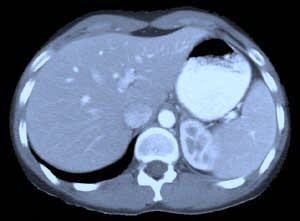Abdominal Imaging

CT (Computed Tomography) is a diagnostic technique that takes information obtained from x-rays passed through the body at different angles and processes it through a computer to construct clear multi-dimensional images (slices) of the part of the body being scanned. CT often provides more information than conventional x-rays alone because it is much more sensitive to differences in tissue density and is therefore better at detecting abnormalities.
A CT scan is simple and painless. The technologist will help position you on the CT scanner table and then move the table into position in the CT scanner. Although the technologist will be controlling the procedure from an adjacent room, he or she will be able to see you at all times during the scan.
During the scan you may hear some whirring or thumping sounds. Do not be alarmed, as these are only the normal sounds of the CT equipment. The scanning table may move slightly during the scan, but the movements will be so small that you may not notice them at all. Just relax and lie still.
Some CT exams also require an intravenous (IV) contrast agent, which the radiologist administers through a vein in the patient's arm. This contrast agent helps highlight blood vessels and enhances any abnormalities to make it easier for the radiologist to provide a proper diagnosis.
If your CT scan requires that you have an IV contrast, it is important that you do not eat or drink anything for at least 3 hours before your exam (although you may take any medication at this time with a small amount of water). If you have eaten anything within three hours of your exam, please tell the radiologist or technologist before he or she begins your exam.
A CT exam of the abdomen or pelvis usually takes about two hours, from initial check-in to completion of the study. This includes at least one hour for the contrast agent to fill your stomach and intestines, and about 40 minutes for the CT scan itself.
MRI (Magnetic Resonance Imaging) is a diagnostic technique that uses a powerful magnetic field, radio waves and a computer to obtain high-quality, images of organs and structures within the body. Unlike x-rays and CT (Computed Tomography), MRI uses no radiation. In addition, MRI generally provides much higher contrast between normal and abnormal tissues and is therefore considered by many physicians to be one of the most effective diagnostic tools available. An MRI examination is simple and painless.
The following will be included as part of your exam:
A questionnaire/interview. We must know whether you have any implanted devices, such as a heart pacemaker, artificial heart valve, drug infusion, implants or orthopedic prosthesis. In many cases, people with such devices cannot undergo an MRI scan, due to the danger of exposure to the scanner's strong magnetic field. For the same reason we also need to know if you have any metal clips or plates in your body. It is also very important that you tell the technologist if you are pregnant or think you might be pregnant, since it is our present policy not to scan pregnant women.
Preparation for your scan. Metal objects of any sort are not permitted in the MRI scan area, since the strong magnetic field can damage these objects. These include jewelry (watches, earrings, necklaces, bracelets, hairpins, etc.) as well as hearing aids. In addition, you must not bring any credit cards, bank ATM cards or other cards with magnetic strips into the scan area, since the scanner's strong magnetic field can erase the information stored on these cards.
During your scan. You will be on a scanner bed, which will slide into the MRI scanner either head-first or feet-first, depending upon the part of the body to be scanned. During the scan vou will hear repetitive thumping and clicking noises. Do not be alarmed, as these are just the normal sounds of the magnet and internal equipment in the scanner. Throughout the scan, which usually lasts between 30 and 60 minutes, you must remain completely still, since any movement inside the scanner will affect the quality of the scan. For your comfort, the scanner is equipped with a sound system, so feel free to bring your favorite CD or cassette to listen to during your scan. You will also be able to talk with the technologist during your scan via a microphone and loudspeaker in the scanner.